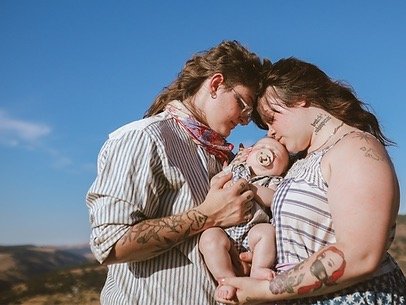Language Matters: 5 Reasons to Say "Birthing People" instead of "Mother"
The language we use matters. You may have noticed that The Touchstone Institute often uses the term "birthing people" or "mothers and all birthing people." This is a deliberate reflection of our values and commitment to inclusive perinatal health for all.
1. Advocacy for All
Our commitment to advocacy is rooted in our belief in reproductive justice, which includes comprehensive perinatal mental health care and bodily autonomy. By using the term "birthing people," we aim to push the needle forward, advocating for those who give birth, but do not identify as mothers. We envision a future where people of all identities have access to life-changing support when they need it.
2. A Stand Against Oppression
Language is powerful. We recognize that societal systems of oppression are often replicated in therapeutic settings and we strive to break these patterns. The way health care professionals communicate can significantly affect their clients' mental and physical health, making it crucial for us to use inclusive language. By using "birthing people," we aim to ensure our external values match our internal ones and contribute to healing and growth for all involved.
3. Acknowledging Trauma
We recognize the profound impacts of perinatal trauma on birthing people of all identities. The term "birthing people" allows us to acknowledge the potential trauma that transgender and non-binary individuals may face during the perinatal period, leading to more effective trauma-focused interventions and healthier communities overall.
4. Holistic, Intersectional Care
Our holistic approach to care takes into consideration the intersections of our unique identities. By referring to "birthing people," we strive to offer integrative and supportive care that respects all perinatal experiences.
5. Year-Round Inclusivity
At The Touchstone Institute, we believe in inclusivity all year round. Pride month is not just a celebration of diversity, but a time to recognize the violence and discrimination faced by LGBTQIA2S+ communities, particularly transgender individuals. Thus, using the term "birthing people" forms part of our commitment to creating an inclusive environment every day, not just in June.
The language we use in health care is more than just semantics; it has real-world impacts on the people we serve. By using "birthing people," we are recognizing and advocating for all birthgivers. We invite all health care providers and advocates to join us in adopting gender-neutral terms in their practice and discourse, fostering a more inclusive and just future for perinatal care.
View this video for more from our team on how we strive to acknowledge all mothers and birthing people in order to provide more holistic trainings to practitioners.




